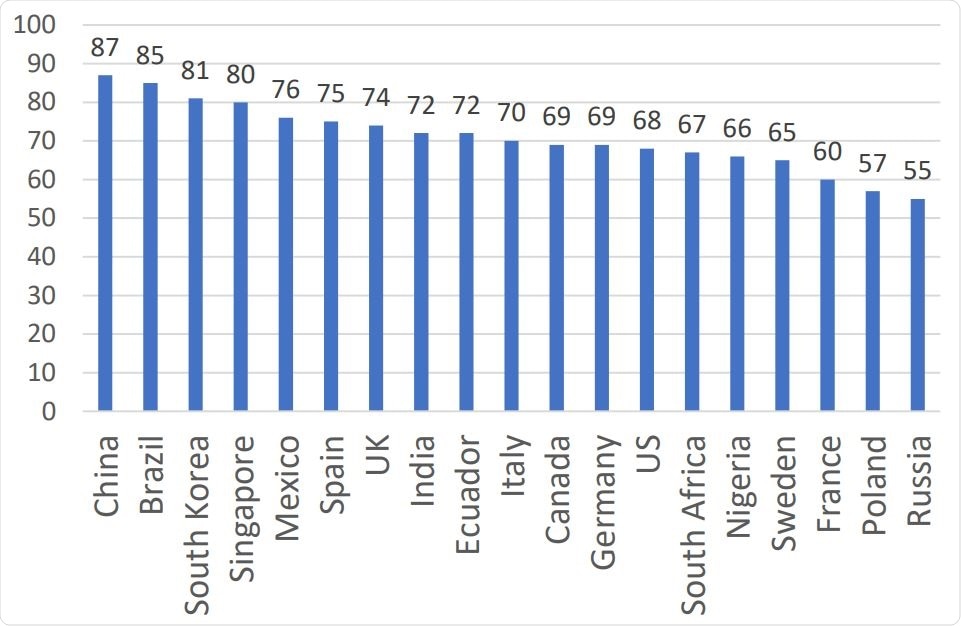The COVID-19 pandemic, caused by the severe acute respiratory syndrome coronavirus 2 (SARS-CoV-2), continues to impose an immense mortality and morbidity burden while seriously disrupting societies and economies worldwide. Thus, governments must be prepared to ensure a comprehensive and equitable distribution of safe and effective vaccines once they become available.
This necessitates adequate health system capacity, as well as strategies in place to enhance acceptance and trust in the vaccine and its delivery. However, vaccine hesitancy presents considerable obstacles in many countries that aim to achieve much-needed coverage and herd immunity.
Furthermore, misinformation spread via multiple channels may adversely affect the acceptance of a COVID-19 vaccine. Likewise, the accelerated pace of vaccine development has additionally heightened public anxiety.
This is why researchers from the University of Barcelona in Spain, City University of New York, Georgetown University and Emerson College in the United States, as well as from London School of Hygiene and Tropical Medicine in the United Kingdom, decided to study the potential acceptance of a COVID-19 vaccine in over 13,000 randomly selected subject from 19 countries with high COVID-19 prevalence.

 This news article was a review of a preliminary scientific report that had not undergone peer-review at the time of publication. Since its initial publication, the scientific report has now been peer reviewed and accepted for publication in a Scientific Journal. Links to the preliminary and peer-reviewed reports are available in the Sources section at the bottom of this article. View Sources
This news article was a review of a preliminary scientific report that had not undergone peer-review at the time of publication. Since its initial publication, the scientific report has now been peer reviewed and accepted for publication in a Scientific Journal. Links to the preliminary and peer-reviewed reports are available in the Sources section at the bottom of this article. View Sources
Survey specificities
In short, the researchers basically analyzed two questions from the COVID-SCORE study, where participants gave their responses to a total of 22 items – including two related to vaccine uptake, one related to confidence in pandemic information sources, and standard demographic questions on age, gender, household income, and education level.
There were a total of 13,426 respondents from 19 countries, which represented 55% of the world population. Women comprised 53.5% of the study sample, and 63.3% of respondents earned above 32 US dollars per day. Most of them had a university degree and were between 25 and 54 years of age.
All the survey data has been collected between June 16 and 20, 2020. The researchers concentrated on the distribution of the responses against the different questions for the entire data set and additionally examined differences by country.

“If a COVID-19 vaccine is proven safe and effective and is available, I will take it”
Divergence in vaccine acceptance rates
This study showed that in the majority of the 19 countries surveyed, readiness to accept a COVID-19 vaccine is not adequate. More specifically, a total of 71.5% of respondents reported they would be very/somewhat likely to take a COVID-19 vaccine, while 61.4% reported they would adhere to their employer's recommendation.
Differences in acceptance rates across countries were stark, and ranged from almost 9 in 10 in China, to fewer than 6 in 10 in Russia. However, one of the most important findings was significant variation across demographically defined groups, being least among those with lower income levels and education.
Additionally, this study observed age-related associations and found that the elderly more readily report that they would take a vaccine; conversely, younger respondents were more likely to adhere to an employer's vaccine guidance.
Men were generally less likely than women to accept vaccines or their employer's recommendation for vaccination, albeit this association was not large. Finally, those with higher income levels and greater trust in government-provided information sources were most likely to accept a vaccine.
The need for appropriate communication interventions
This far-from-universal inclination to accept a COVID-19 vaccine is undoubtedly a cause for concern. Unless we better understand and address the reasons and motives behind it, variation in COVID-19 vaccine coverage between countries may potentially hamper the reinstatement of global connectivity and economic recovery.
"Future vaccine communication interventions should consider the level of scientific and general literacy in sub-populations, identify locally trusted sources of information, and go beyond public announcements that vaccines are safe and effective," said study authors in their medRxiv paper.
"They should also directly address community-specific concerns or misconceptions, historic issues breeding distrust, and be sensitive to predominant religious or philosophical beliefs," they add.
Hence, a careful balance is needed between explaining the necessity of universal vaccine coverage and avoiding any hint of coercion. This is precisely the role of community-based groups that need to be impartial in order to build a foundation for a future COVID-19 vaccine.
In any case, efforts must be scaled up immediately in preparation for the thus far elusive promise of an effective and safe COVID-19 vaccine. At the same time, transparent and consistent communication by government officials is pivotal for public confidence.

 This news article was a review of a preliminary scientific report that had not undergone peer-review at the time of publication. Since its initial publication, the scientific report has now been peer reviewed and accepted for publication in a Scientific Journal. Links to the preliminary and peer-reviewed reports are available in the Sources section at the bottom of this article. View Sources
This news article was a review of a preliminary scientific report that had not undergone peer-review at the time of publication. Since its initial publication, the scientific report has now been peer reviewed and accepted for publication in a Scientific Journal. Links to the preliminary and peer-reviewed reports are available in the Sources section at the bottom of this article. View Sources